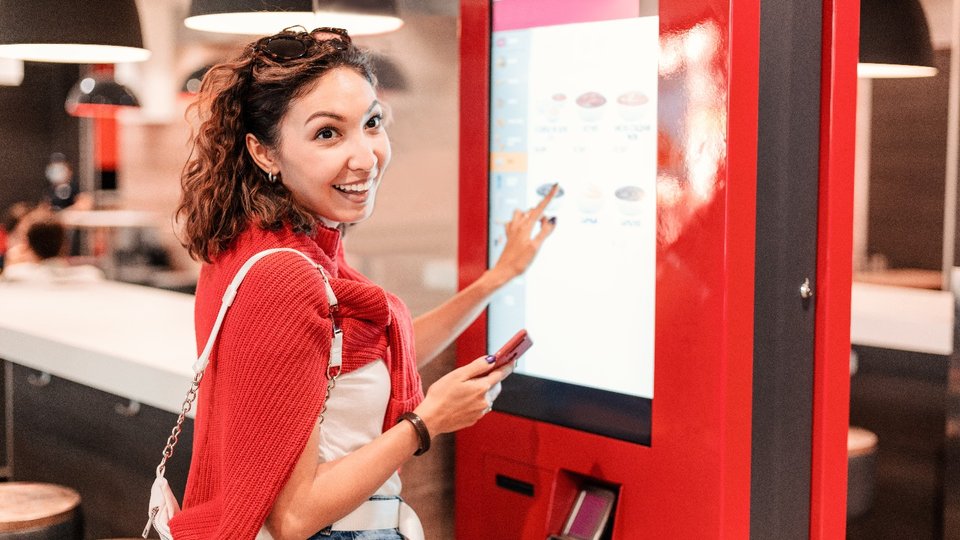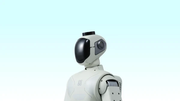Self-Service
Consumers prefer self service to human interaction, but not all are happy about it
A survey quantified consumers’ preference for self service over in-person purchases, but it also revealed concerns about declining personalization caused by automation.

June 28, 2023 by Elliot Maras — Editor, Kiosk Marketplace & Vending Times
Self service has become the preferred method of making a purchase in the U.S. And while Gen Z, Millennials and Gen X consumers are clearly leading the charge, Baby Boomers aren't far behind.
That's according to a recent survey of 1,000 Americans by PlayUSA, an online news source for the legal gambling industry. The survey queried Americans about all types of purchases in addition to legalized gambling.
And while the survey quantified consumers' preference for self service over in-person purchases, it also revealed concerns about declining personalization caused by automation.
 |
A summary of the survey provided to this website by PlayUSA, a Las Vegas news source, surmised that self service has become an integral part of the human experience.
"You can start your day by waking up to an alarm clock … on your phone," the summary noted. "If you're running late to work, you can order a coffee from your favorite shop ahead of time using an app.
"You can even order all of your groceries and have them delivered to your car without stepping foot inside the store!"
Survey highlights include:
- More than four out of five (84%) Americans said they like using self-service kiosks, and 66% said they would choose to use one over a manned checkout.
- 84% of Gen Z and 76% of Millennials said they prefer using tech-based checkouts, as did 57% of Gen X and 46% of Baby Boomers.
- The reasons for the preference varied. Nearly three quarters (71%) said it's because manual checkouts take longer, but 60% said they go this route because they don't have to talk to people. In fact, nearly one in six (14%) said they would wait for a self-service kiosk even if a manned checkout had no line.
- A fifth of respondents (20%) said they would keep using mobile apps for curbside pickup even if companies added fees for the service.
- A 61% majority of self-described "introverts," who accounted for 66% of total respondents, said technology has reduced their social anxiety, while 89% of introverts said tech has made it easier to navigate everyday life.
Reservations about less personalization
 |
The preference for technology comes with some reservations about less personal communication.
While 62% like that technology is replacing face-to-face interactions, 67% also said technology has made it harder for people to connect in a meaningful way. In addition, 75% said tech-based interactions have contributed to a decrease in social skills, 68% said it has led to a decrease in empathy and 31% said they felt lonely because of fewer face-to-face interactions.
While the results indicated a preference to avoid human interaction contributes to a preference for self service, the results also indicated the reverse. The younger age groups that most prefer using technology expressed the most anxiety about talking to people on the phone.
- Nearly half (45%) of respondents admitted they get anxious talking on the phone. The anxiety was greatest among younger respondents: 61% of Millennials cited it, followed by 59% of Gen Zers, 39% of Gen Xers and 19% of Baby Boomers.
- Nearly half (45%) of the respondents said they have asked another person to make a call for them so they did not have to talk on the phone. Once again, age was a factor: 63% of Gen Zers, 55% of Millennials, 41% of Gen Xers and 22% of Baby Boomers said they have asked another person to make a call for them so they did not have to talk on the phone.
- A 65% majority of respondents said they prefer to make dinner reservations online instead of calling the restaurant.
- A 60% majority also said they bought items online to avoid interacting with people in stores.
- Nearly three quarters (74%) said they had a delivery driver leave food on the doorstep rather than open the door to grab it from them.
- More than half (51%) said they became annoyed if a host seats someone at a table next to them in an open restaurant and a quarter (25%) said they would eat alone at a restaurant if they had technology with them.
- More than half (54%) also admitted they do not like talking with a driver while in a taxi or rideshare. In addition, nearly one third (30%) said they give rideshare drivers better ratings if they don't talk as much.
- A 57% majority said they would prefer to make a complaint about a business online rather than make a call to voice a complaint.
Technology and gambling
Nearly half (44%) of respondents said they prefer gambling online to gambling in person.
Even in casinos, many people prefer games that don't require personal interaction. More than one third (34%) said they played casino games on kiosks to avoid social interactions.
Eleven percent admitted to placing a bet online or at a kiosk while inside a casino or sportsbook. Reasons for doing this varied. Nearly a quarter (71%) said they did it for convenience, while nearly one third (31%) said they did it to avoid personal interaction.
A 62% majority said they prefer to buy lottery tickets from a kiosk instead of from store clerks, and close to half (43%) of those who play the lottery said they would play more if they could buy tickets using their phone.
The survey queried respondents in 48 states who ranged in age from 18 to 77 with an average age of 43. One quarter (25%) were Gen Z, 25% were Millennials, 25% were Gen X, and 25% were Baby Boomers. 49% were men, 49% were women, 1% were non-binary and 1% preferred not to share their gender.
Charts provided by PlayUSA.
About Elliot Maras
Elliot Maras is the editor of Kiosk Marketplace and Vending Times. He brings three decades covering unattended retail and commercial foodservice.
 ChatGPT
ChatGPT Grok
Grok Perplexity
Perplexity Claude
Claude




